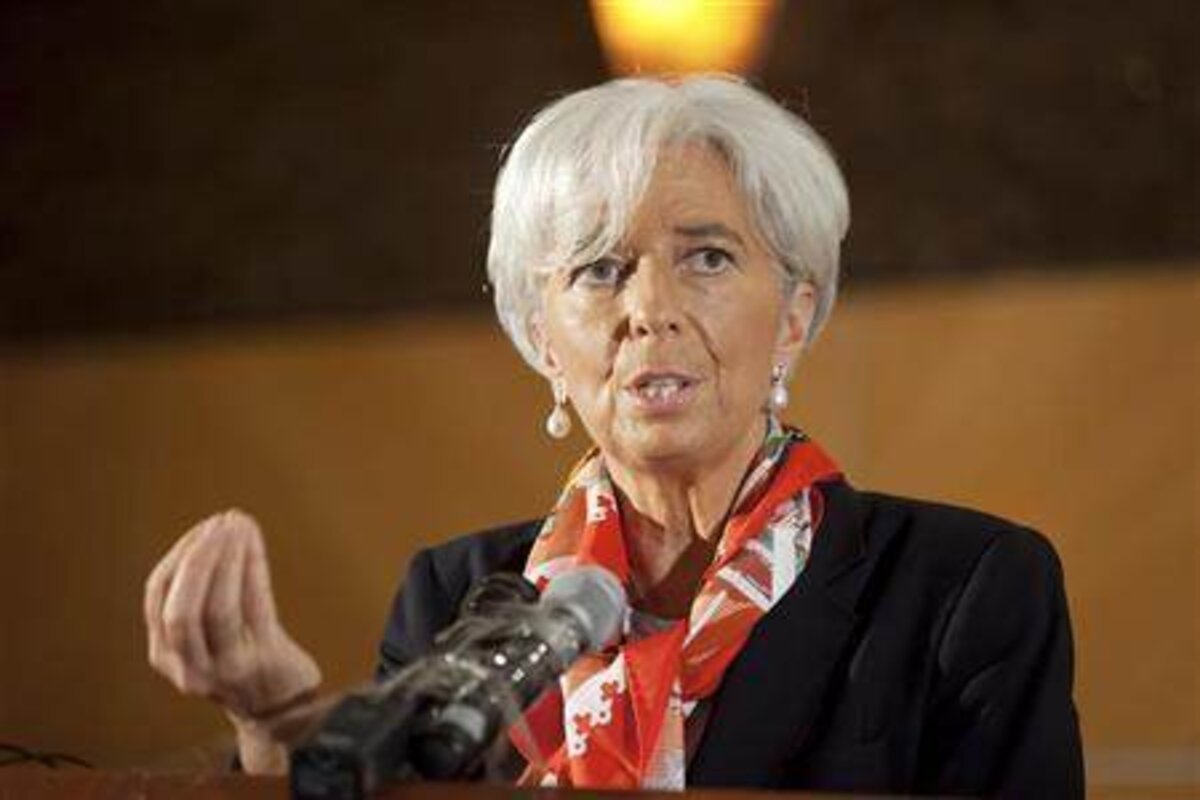The French head of the International Monetary Fund Christine Lagarde is to be summonsed to appear soon before French judges investigating alleged misappropriation of public funds, Mediapart can reveal.
Lagarde, who took over as Managing Director of the IMF in 2011, after her predecessor Dominique Strauss-Kahn was forced to stand down over a sex scandal, will be heard by members of the Court of Justice of the Republic (CJR) investigating an arbitration procedure that in 2008 awarded controversial businessman Bernard Tapie 403 million euros compensation from the public purse.

At the time Largarde was France's finance minister and it was her decision to allow the case to be removed from the legal system and placed in an arbitration process that led to the huge payout.
Mediapart understands that by the end of the week Lagarde's lawyer Yves Repiquet will be informed of the exact nature and time of the hearing. In particular he will be told whether Lagarde will be appearing as an 'assisted witness' – a French legal status that gives her full access to the case file, assisted by a lawyer, while investigations continue into her suspected role - or will be formally placed under investigation, which is one step short of charges being brought. Her questioning is expected to follow soon afterwards.
Mediapart has sought to contact Yves Repiquet, but he had offered no comment by the time this article was published.
The investigation are into claims that Lagarde was involved in 'aiding and abetting falsification' in relation to the arbitration process and of 'misappropriation of public funds'. There is no suggestion that Lagarde benefited personally from any decision she made, and she denies any wrongdoing.
The possibility that she might face questioning by the Court of Justice of the Republic has hung over Christine Lagarde for some months.
Key questions
One of the key questions is why Lagarde pursued the decision of her predecessor, Jean-Louis Borloo, a close friend of Tapie for whom he once served as a lawyer, to remove the case from the justice courts and opted for a private arbitration procedure that was highly favourable for Tapie. The decision to drop the legal fight and enter into arbitration was taken immediately after President Nicolas Sarkozy's election in May 2007, when Borloo was appointed, for a one-month period, finance minister. Lagarde succeeded him in June 2007.
It has long been suggested that most of the instructions over the Tapie arbitration affair came from the Elysée Palace; the then-president Sarkozy is a friend of Tapie, a flamboyant tycoon and former centre-left politician who subsequently gave public support to conservative Sarkozy's 2007 election campaign.
But Lagarde herself has always denied the suggestion of the Elysée's close involvement, and it was her who signed most of the administrative papers related to the affair.
It was Lagarde who in September 2007 gave written instructions for senior civil servants involved to start the arbitration process that Bernard Tapie wanted. And it was she, too, who in July 2008 signed instructions ordering the same civil servants not to appeal against the 403 million-euro award given by the arbitration process.
That award, paid out of public funds, ended a longstanding legal battle until then played out in courts of law. It centred on Tapie's alleged spoliation by the former state-owned bank Crédit Lyonnais during its mandated sell-off of Tapie's business interests, notably his controlling share of the Adidas sportswear and accessory company, in the early 1990s.
Tapie's claim for damages was brought against the Consortium de Réalisation (CDR), the French government entity responsible for the liabilities of the defunct bank which collapsed following a high-risk lending scandal in 1993.
The Court of Justice of the Republic (CJR) will also want to examine claims that the witness statement of the Consortium launching the arbitration was interfered with after it had been approved. And if this was the case, whether Christine Lagarde knew about it.
Another key question is over the status of one of the three arbitrators involved in the process, Pierre Estoup, former president of the Versailles court of appeal. In the autumn of 2008 the Minister of Finance was informed that Estoup had failed the requirement upon him to make full disclosure and had not informed the authorities that he had in the past taken part in three other arbitrations, in which Bernard Tapie's lawyer Maurice Lantourne had also participated.
When informed of this, Lagarde could have used the information to launch an immediate appeal against the arbitration award and thereby block the handing over of the 403 million euros to Bernard Tapie. But not only did she not use the knowledge as a reason to appeal, she apparently hid the information from a parliamentary inquiry at the National Assembly that was at the time holding hearings into the affair.
In May 2001, senior public prosecutor Jean-Louis Nadal carried out a preliminary investigation of the affair at the request of MPs. In his report, revealed by Mediapart, the prosecutor described Lagarde's behaviour as "aimed at obstructing the law". It was his report that led the CJR to investigate Lagarde's role in the Tapie arbitration award.
The CJR is the French court designated to investigate suspected malpractice by government members in the course of their duties, and to judge them if charges are brought.
---------------------------------
English version: Michael Streeter


